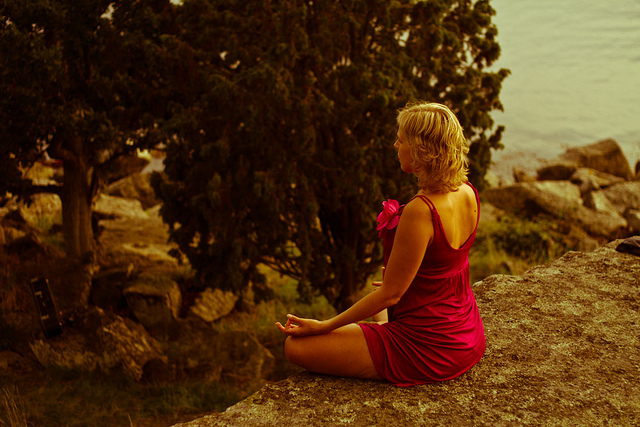It’s official (and scientific): yoga makes us feel better!
When I started yoga around 10 years ago, I glossed over the aspects of the class which didn’t relate to the physical side of yoga, tolerating it because I was enjoying the great workout yoga was giving me.
I liked the peaceful and calm teacher, and I didn’t mind chanting and meditating if she said it would be good for me. I noticed immediately how good yoga made me feel, but I figured that it was working in the same way as a workout in the gym or a run in the park would do.
Fast forward 10 years, and my perspective has changed. My own practice has shown me that yoga brings more to the table than exercise. This doesn’t mean that the exercise isn’t valuable, of course it is, but a regular yoga practice offers far richer and deeper rewards than those which may not be immediately obvious.
Anxiety and stress anyone?
Yoga practitioners soon notice that yoga just makes you feel better. Specifically, it changes the way you deal with stress. Somehow, the hard things become easier, and it becomes more possible to let go of stress. The great thing is that there are an increasing number of studies being done about just how and why this might work. Some researchers are looking at the effects of yoga on various physical and mental health conditions.
Most practitioners and teachers love talking about yoga philosophy, but find that some students and friends have a low tolerance for what they consider hippy-dippy yoga speak. Now it’s becoming more and more possible quote the science to back it up. Isn’t it great that science can now explain what the yogis always knew?
Here’s the science
There are many examples to choose from, and here are just a few:
In 2004, a scientist named Karen Pilkington and her colleagues reviewed eight previous studies on the impact of yoga on anxiety. She found that there was a marked improvement when using yoga as an anxiety treatment. Interestingly, yoga also showed a positive impact on populations with obsessive compulsive disorders (OCD).
One of the studies showed stronger benefits compared to aerobic based activity. People have often argued that all exercise will have these beneficial effects, but this study makes a distinction made between mindful modes of exercise (such as yoga) and others (such as jogging). This research also exposed a slightly different angle which suggests that yoga may decrease our sensitivity to stress, rather than taking the effects of stress away.
In 2010, yoga researcher Dr. Chris Streeter from Boston University found that one hour of yoga practice increases the levels of a neurotransmitter called GABA. To put this into perspective, this neurotransmitter inhibits the stress response in the body, in fact, pharmacological treatment of anxiety sometimes involves taking medication which increases GABA levels.
So in this study, yoga was compared to walking, and it was found that those who were practicing yoga were experiencing greater benefits in mood and anxiety than those who were doing a walking intervention.
A 2013 study by Saper et al surveyed over 600 yoga practitioners. Their reasons for practising yoga were for general wellness (81%), physical exercise (80%) and stress management (73%). This paper recommends that given the perceived benefits of yoga, it should be made more accessible to the public. What a great motivation to go out there and try yoga!
The proof is in the pudding.
It doesn’t matter why people start yoga. In a market which is increasingly obsessed with the body-beautiful, “six packs” and “guns,” it can be said that some of the classic aspects are being watered down. However if the style of yoga we practice includes postures, breath control, concentration, relaxation and meditation, then some of these wonderful juicy benefits will become available.
Over time practice will change us, inside and out.
Relephant:
32 Unusual Benefits of Yoga.
Author: Karen Verhoog
Editor: Catherine Monkman
Photo: Flickr/Andreas Ivarsson







Read 1 comment and reply